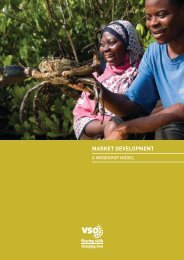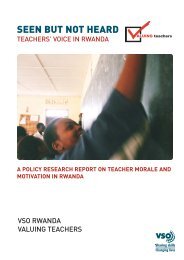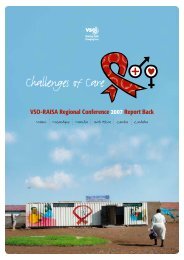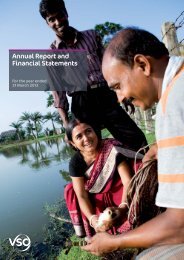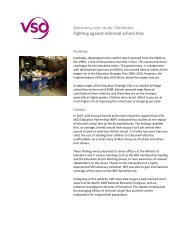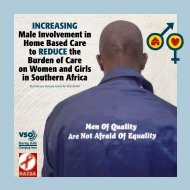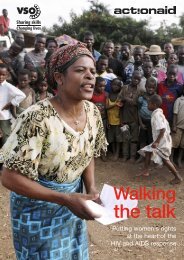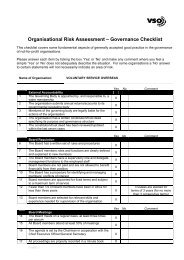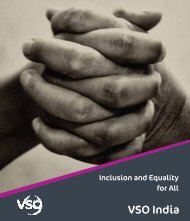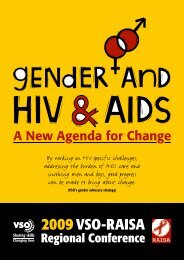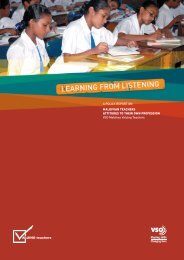Teachers' Voice â Nigeria - VSO
Teachers' Voice â Nigeria - VSO
Teachers' Voice â Nigeria - VSO
- No tags were found...
You also want an ePaper? Increase the reach of your titles
YUMPU automatically turns print PDFs into web optimized ePapers that Google loves.
Teachers argue that these factors diminish their motivation levels and advise parents andcommunity to work with them as opposed to against them. They propose a partnership in mutualrespect for the sake of their children’s future.8.3.3 COMMUNITY RELATIONS: STAKEHOLDERS’ VIEWS“We know, as parents, we are not getting the best. Teachers and children are notperforming their best – they have lost interest. Years ago, teachers and childrenworked hard to perform their best but now people become rich but they cannot tellyou the source. The government says things, but only for the sake of saying something.They have neglected teachers and children alike.”(NAPTAN Representative)Community members and stakeholders admit that teachers are treated with disrespect anddistaste, due to their low status in society and their lack of faith in the <strong>Nigeria</strong>n educationsystem. Community members confess: “when teachers discipline the students, parents cometo fight them”. This lack of faith in teachers is extended into lack of confidence and trust inauthorities at all levels and a general unhappiness with those functioning as role models in<strong>Nigeria</strong>n society today.“The general public has lost interest in any promise made by the government and that’swhy they are against reforms, they are not sure: is it a way of protecting an interest, orthe interest of the general public.”(NAPTAN Representative)The discrediting of teachers and the educational system is expressed in the lack of commitmentfrom parent teacher associations attached to many schools. Head teachers have become verydemotivated as parents regularly fail to show up at parent teacher meetings and are irritated bythe lackadaisical attitude of the parent-teacher associations. They insist that parents need tostart taking their roles seriously.On a positive note, realising the need for change some communities are already taking responsibilityfor the education of their children in an attempt to remedy the situation. They realise how powerfulthey are when they stand united and therefore work actively to bridge the relationship with teachers.They encourage their children to go to school and they take teachers’ judgements seriously. Theycreate an environment that ensures children progress through education without pressure orhindrance – thus preventing them from leaping classes (from primary 4 to 6 and/or junior secondaryschool 1), which some parents demand. This stance guarantees the opportunity to repeat classesfor students who fail exams, thus giving them the chance to develop and progress in accordancewith their abilities, as opposed to what their parents favour.Numerous stakeholders have suggested ways to achieve these goals. Especially the FulaniCommission is very active:“To improve community and teacher relations we go round the community with thehead teacher to sensitise community leaders about the importance of education. Wehave introduced adult classes to show parents the importance of education. Thatshould be done everywhere.”(Representative of the Nomadic Commission, who oversee all nomadic schools)Nomadic schools have the added problem that parents who don’t see the need for educationregularly keep their children home to work.In nomadic schools that cater for children of traditional and isolated communities, especially inthe north, families regularly remove both boys and girls from education by the age of 12 to bemarried. It is common to find parents, still children themselves, without even the most basic48




